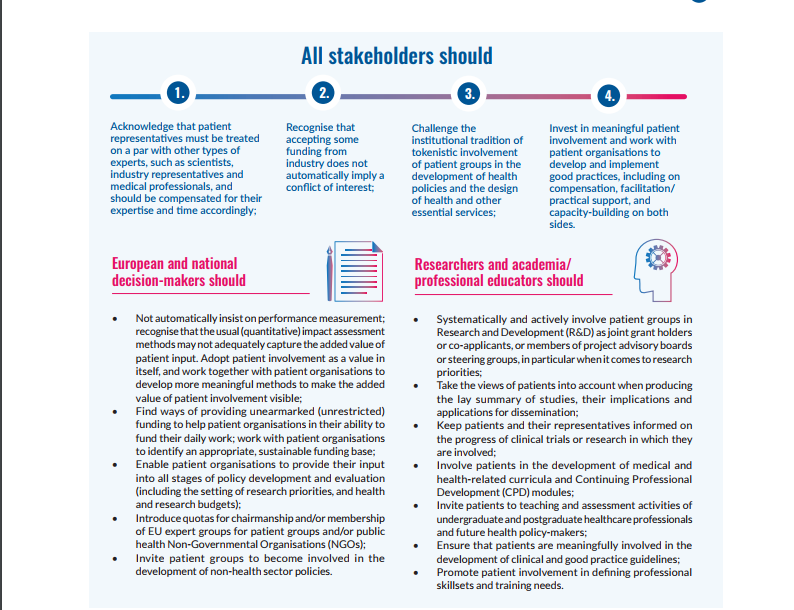In November, the European Patients’ Forum (EPF) published the report gathering key insights and opinions from the European patients’ movement, including EFA’s, demonstrating the added-value through the work and representation of patient associations. The report is the result of a pan-European survey filled in by EU and national EPF Members as well as by eligible patient/consumer associations at the European Medicines Agency.
The report shows that patient associations are legitimate stakeholders in civil dialogue in health-related policies, despite the many challenges this associative work has for those involved. Patient associations structure and increase the voice of individuals living with diseases, that otherwise wouldn’t be represented. The report focuses on the 4 main pillars of patient associations activities: policy, capacity building and education, peer support and research & development (both health and pharmaceutical).
On policy, respondent patient associations documented their work to help shape decisions to improve patients’ lives. Our work demonstrates we are invaluable partners in the policy process, providing input at every stage of the processes, through stakeholder advisory groups, expert panels, European and/or national government public consultations or institutional meetings. We promote the interests of patients at all stages of policy development and in a range of institutional settings. There may be the misconception that this work is something that we should just be grateful to be able to do and that it somehow happens just like that and voluntarily without resourcing. In fact its hard work and must be professionally organised to manage accountability, democracy and support for volunteers.
On Capacity Building and Education, patient organisations strengthen the organisational and governance structures of their constituencies with the aim of helping patient groups become more resilient, sustainable and effective. We invest in capacity-building for policy-makers, industry, academia and the media and we work to promote health literacy to help patients make sound health care decisions for themselves.
On Peer Support, respondents clearly showed that we co-deliver self-management education and deliver various forms of support into the wider patient community, as we provide peer mentoring, counseling or listening services, and legal and financial support.
On Research and Development, patient organisations are increasingly active research collaborators, including through setting of research priorities and data collection. They are avid advocates for greater involvement of patients in the early stages of pharmaceutical research and development, as well as Health Technology Assessment (HTA), and argue for a similar approach in research and the development of disruptive innovation.
At EFA we have our longstanding, but developing project programme that brings evidence for policy. Patient evidence for policy, for use by all and to step up awareness where its most needed.
However many challenges are jeopardising the impact patient associations have in policy, capacity building, peer support and research. One of the most pressing ones is the lack of resources and funding. In particular public funding. There is also the issue of credibility of the sector and last but not least the persistence of tokenism when dealing with patient organisations, which also includes a framework to access independent, timely and adequate resources to ensure the representativeness of the patients voice.
If you are member of a patient organisation, please disseminate the full report and its conclusions widely.
